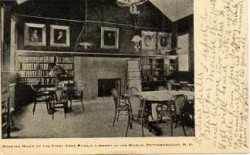Where is the first tax-supported library located?
 April 9, 1833 — The Peterborough Library opened today in New Hampshire, making it the nation’s first first tax-supported library.
April 9, 1833 — The Peterborough Library opened today in New Hampshire, making it the nation’s first first tax-supported library.
However, it will take another 19 years for the Boston Public Library (pictured below) to open.
What took so long?
The process began in 1839, when Frenchman Alexandre Vattemare suggested that all of Boston’s libraries combine themselves into one institution for the benefit of the public. Most small libraries weren’t interested in the idea. So Vattemare had large bundles of books sent from Paris — in 1843 and 1847 — to build the collection. Boston Mayor Josiah Quincy, Jr. donated $5,000 to begin the funding process.
 But what jumpstarted the campaign was the death of John Jacob Astor in 1848. The German immigrant, who at his death was the wealthiest man in America, bequeathed $400,000 to create the Astor Library in New York. It opened its doors in 1849 in the building which is now the home of The New York Shakespeare Festival’s Joseph Papp Public Theater. Although the books did not circulate and hours were limited, it was a major resource for reference and research.
But what jumpstarted the campaign was the death of John Jacob Astor in 1848. The German immigrant, who at his death was the wealthiest man in America, bequeathed $400,000 to create the Astor Library in New York. It opened its doors in 1849 in the building which is now the home of The New York Shakespeare Festival’s Joseph Papp Public Theater. Although the books did not circulate and hours were limited, it was a major resource for reference and research.
Soon after, Boston Mayor Benjamin Seaver revved up the process to open the public library in Beantown. He recommended to the city council that a librarian be appointed. Edward Capen landed the job. To house the collection, a former schoolhouse located on Mason Street was selected as the library’s first home.
On March 20, 1854, the Reading Room of the Boston Public Library officially opened to the public.
Sources
Words of Wisdom
The public library is in every sense an institutional descendant of the social library, but in its governmental relationships it represents an innovation. At Salisbury and Lexington municipal support was introduced to strengthen existing social libraries, but at Peterborough, New Hampshire, in 1833, a library was established which from the beginning was truly a public institution and in all its relationships to the community was remarkably like the public library of today. The significance of the Peterborough Town Library, then, lies less in its primacy than in its modernity.





